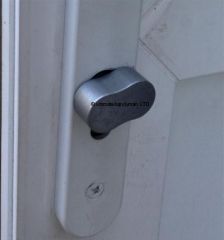Euro cylinders are available in several different sizes to accommodate different thicknesses of doors. Below is a list of the popular sizes as well as a picture showing how to measure a euro cylinder. It's essential that you get the correct size euro cylinder as so many euro cylinders seem to be either too long or too short for the lock that they are installed into. Please see our page on replacing a euro cylinder and also our page on euro cylinders which shows some of the more secure locks available.
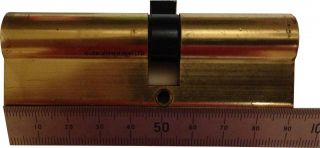
You can measure a euro cylinder in situation or you can remove it. If you are removing it make sure that the euro cylinder is the correct length in the first place.
When measuring the euro cylinder you normally measure from the screw hole, so in this picture the overall length of the euro cylinder is 90mm but this would be represented as a 40/50 as it is 40mm to one side of the screw and 50mm to the other. This measurement can be critical on some anti snap locks as they are designed to be installed only one way around and are normally marked for the external side.
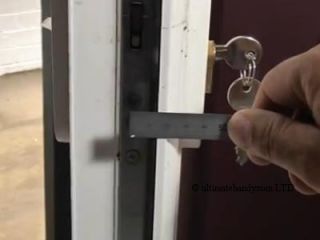
You can measure the euro cylinder in situation by measuring from the retaining screw to the outside of the door handle.
Popular sizes of Euro cylinder are (MM)-
- 30-30
- 30-40
- 30-45
- 30-50
- 35-35
- 35-40
- 35-45
- 35-50
- 35-55
- 35-60
- 40-40
- 40-45
- 40-50
- 40-55
- 40-60
- 45-45
- 45-50
- 45-55
- 45-65
- 50-50
- 55-35
- 55-40
- 55-45
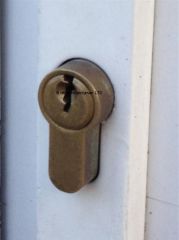
This euro cylinder is sticking about 10mm out of the lock. This makes it easy for an intruder to snap the lock and quickly gain entry to the property. If the euro cylinder is protruding like this on the inside of the property it is not as much as a problem, but it looks much better if the cylinder is flush with the door handle.
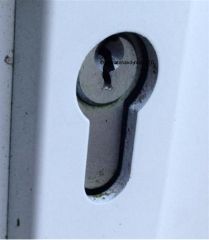
This Euro cylinder is too short, although this is not as bad a protruding cylinder it can cause problems, so a flush fitting cylinder or almost flush is preferred.



